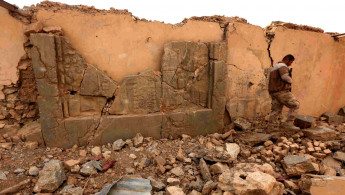UN: Destroying cultural heritage may constitute war crime
The U.N. Security Council on Friday unanimously adopted a resolution condemning the unlawful destruction of cultural heritage stating that attacks perpetrated on heritage sites by the Islamic State group, al-Qaeda, and other combatant groups may constitute war crimes.
The resolution expands previous measures limited to the illegal trafficking of looted cultural items in order to fund terrorism, and is focused primarily on Syria and Iraq.
It calls for the prosecution of those responsible for attacks against historic monuments and sites, and buildings dedicated to religion, education, art, science or charitable purposes as well as those who carry out illegal excavations, loot and traffic in stolen goods.
In addition to the wanton destruction inflicted on heritage sites such as the ancient Roman city of Palmyra in Syria and Nimrud in Iraq by IS, both the extremist group, other combatant forces, and criminal gangs, have also sought massive profits through the illicit smuggling of antiques and ancient artefacts.
Speaking to The New Arab on Tuesday Amr al-Azm, a history professor and archaeologist involved in campaigns aimed at vouchsafing Syria’s cultural heritage, noted that conflict, and in particular the actions of IS, have had a devastating impact on Syria and Iraq’s cultural heritage.
Al-Azm also said that the illict smuggling of cultural artefacts, with particular reference to Syria, was happening at a "phenomenal scale".
"While we can't put a precise figure on what has been lost from looting, profits are in the hundreds of thousands - possible millions - it is happening at a phenomenal scale," Azm told The New Arab.
"It has become part of the global illicit black market trade, which includes moving drugs, people, and cultural artefacts."


![Minnesota Tim Walz is working to court Muslim voters. [Getty]](/sites/default/files/styles/image_684x385/public/2169747529.jpeg?h=a5f2f23a&itok=b63Wif2V)






